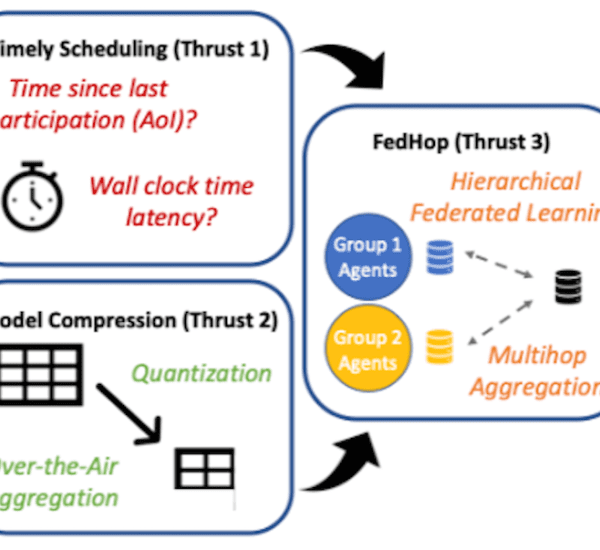Timely Computing and Learning Over Communication Networks

Timely Computing and Learning Over Communication Networks
Dr. Ahmed Arafa
Dr. Ahmed Arafa, Assistant Professor of Electrical and Computer Engineering, was awarded a new grant from the National Science Foundation to study age of information in machine learning. The grant has a total funding of $499,929.00 for three years (UNC Charlotte portion: $249,929.00) including a collaboration award to Dr. Jing Yang at Penn State University (co-PI). The project summary and research goals are as follows. Due to the large volume of datasets and the stringent communication requirements by modern applications, the exchange of data for learning and computing purposes needs to be done in a timely manner. This project introduces the notion of age of information (AoI), used to assess timeliness in networks, into the study of federated learning (FL), with the aim of providing low-latency and communication-efficient means for data exchange in large-scale FL systems. The proposal focuses on designing novel client scheduling, information quantization and client-server association methods to enable timely FL over wireless communication networks. This research is expected to result in significant broader impacts rendering large-scale deployment of real-time monitoring and information sharing systems using FL. It can potentially impact various applications, including collaborative autonomous driving, precision healthcare, and others. The algorithms, analysis, and experimentation developed will advance the state of the art in communication theory, networking, and machine learning, and would naturally translate into undergraduate and graduate courses taught by the PIs in these areas. The goal of this project is to design and analyze efficient agent scheduling policies and communication schemes that realize the notion of timely FL over communication networks imposing various system level constraints. It includes three principal thrusts. The first thrust focuses on developing various timely and low-latency agent scheduling policies, inspired by the AoI metric, and analyzing their convergence performances. To further improve the communication efficiency, the second thrust investigates novel joint model compression and scheduling approaches to enhance the communication efficiency over unreliable networks while maintaining reasonable FL performance. To cope with the dynamically evolving communication environment, the third thrust develops online learning-based agent grouping and model aggregation approaches to enable timely hierarchical FL, where multiple servers are connected through a hierarchical multi-hop network. Finally, a thorough validation of the developed algorithms will be performed using real-world datasets and a lab testbed.